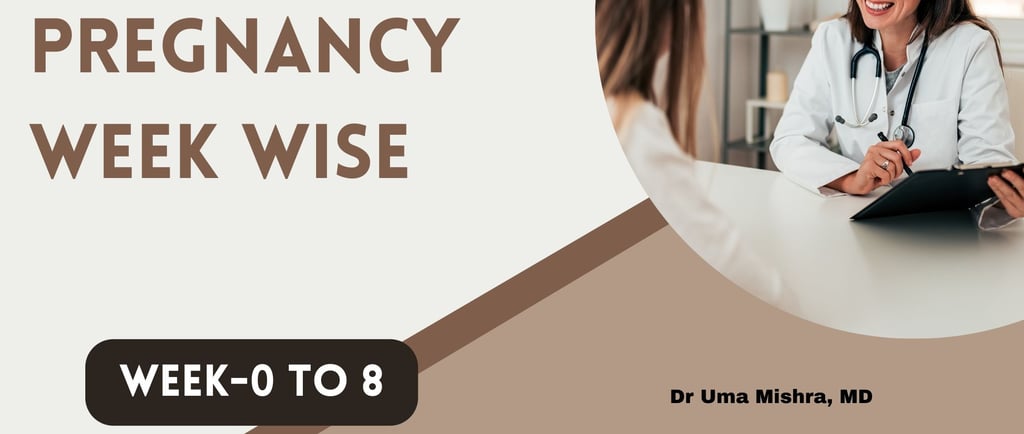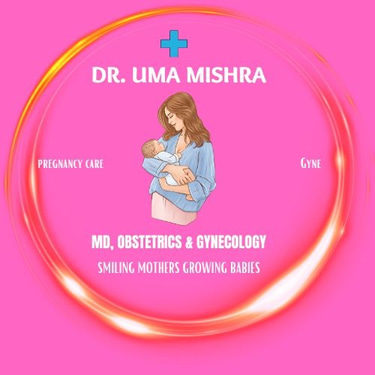The Developmental Stages of Pregnancy: The First Trimester
2/9/20242 মিনিট পড়ুন


In the initial trimester of pregnancy, a series of developmental stages unfold, commencing with conception and progressing through the formation of a blastocyst, embryo, and eventually a fetus. The following highlights key events during the first eight weeks:
Weeks 0 to 4:
The first two weeks are considered pre-pregnancy as conception typically occurs around two weeks after the last menstrual period.
Ovulation triggers the release of an egg, which, if fertilized, becomes a zygote moving through the fallopian tube.
After 3 to 5 days, the zygote becomes a blastocyst, implants in the uterus, and evolves into an embryo.
Week 4:
The embryo develops three layers: endoderm (breathing and digestive system), mesoderm (bones, muscles, heart, and blood vessels), and ectoderm (brain and nervous system).
A yolk sac provides nourishment until the placenta fully forms.
Week 5:
A missed period signifies the embryo's size of approximately 2mm.
Neural tube development begins, forming the brain and spinal cord, and blood vessels connect to the mother, forming the umbilical cord.
Week 6:
Rapid growth sees the closure of the neural tube, heartbeat initiation, and facial features emerging.
Limb buds appear, shaping into legs and arms, and areas for eyes, ears, and the brain become noticeable.
Week 7:
The embryo measures about 10mm, and rapid development occurs in the brain, head, and face.
Arm buds extend into paddle shapes, foreshadowing hand development.
Week 8:
The embryo transitions to a fetus, with developing legs, cartilage, and emerging fingers.
The eyes, ears, and distinct facial features become visible.
The fetus, enclosed in the amniotic sac, relies on the yolk sac for nutrients while the placenta continues to develop, forming structures for attachment to the womb, reaching a length of around 11 to 14mm.
This comprehensive overview underscores the intricate and rapid progression of fetal development during the crucial first trimester of pregnancy.
During the first trimester of pregnancy, proper nutrition is crucial to support the developing fetus and ensure the health of both the mother and the baby. Here are some key nutrition requirements for the first trimester:
Folic Acid:
Essential for neural tube development and the prevention of birth defects.
Recommended daily intake: 400-800 micrograms.
Iron:
Needed for the increased production of red blood cells and to prevent anemia.
Recommended daily intake: 27 milligrams.
Calcium:
Vital for the development of the baby's bones and teeth.
Recommended daily intake: 1,000 milligrams.
Vitamin D:
Supports the absorption of calcium and contributes to bone health.
Recommended daily intake: 600 international units.
Omega-3 Fatty Acids:
Important for the development of the baby's brain and eyes.
Sources include fatty fish (like salmon), chia seeds, and walnuts.
Protein:
Crucial for the growth of the baby's tissues and organs.
Good sources include lean meats, poultry, fish, eggs, dairy products, legumes, and nuts.
Whole Grains:
Provide complex carbohydrates for sustained energy and fiber for digestive health.
Include whole wheat bread, brown rice, and oats in the diet.
Fruits and Vegetables:
Rich in vitamins, minerals, and antioxidants.
Aim for a variety of colorful fruits and vegetables to ensure a broad range of nutrients.
Hydration:
Adequate water intake is essential for maintaining amniotic fluid, supporting the increased blood volume, and preventing dehydration.
Limit Caffeine and Avoid Alcohol:
Limit caffeine intake to about 200-300 milligrams per day.
Completely avoid alcohol as it can harm the developing fetus.
Small, Frequent Meals:
Eating smaller, more frequent meals can help manage nausea and ensure a steady supply of nutrients.
Avoid Raw or Undercooked Foods:
Minimize the risk of foodborne illnesses by avoiding raw or undercooked seafood, eggs, and meats.
It's crucial for pregnant women to consult with their Gynecologist to determine personalized nutritional needs based on individual health, dietary preferences, and any specific conditions. Prenatal supplements may also be recommended to ensure adequate nutrient intake.
Dr Uma MIshra, Gynecologist, MD, Obs & Gyne is one of the most reputed gynecologists in India with 18+ years of experience in the best hospitals of India. She is an expert in High Risk Pregnancy Care. She is associated with the best maternity hospitals in Noida. Plan your Pregnancy Care under Dr Uma Mishra. Consult Today.
Call 8130550269 to book appointments.
To know more visit www.bestgynenoida.com
